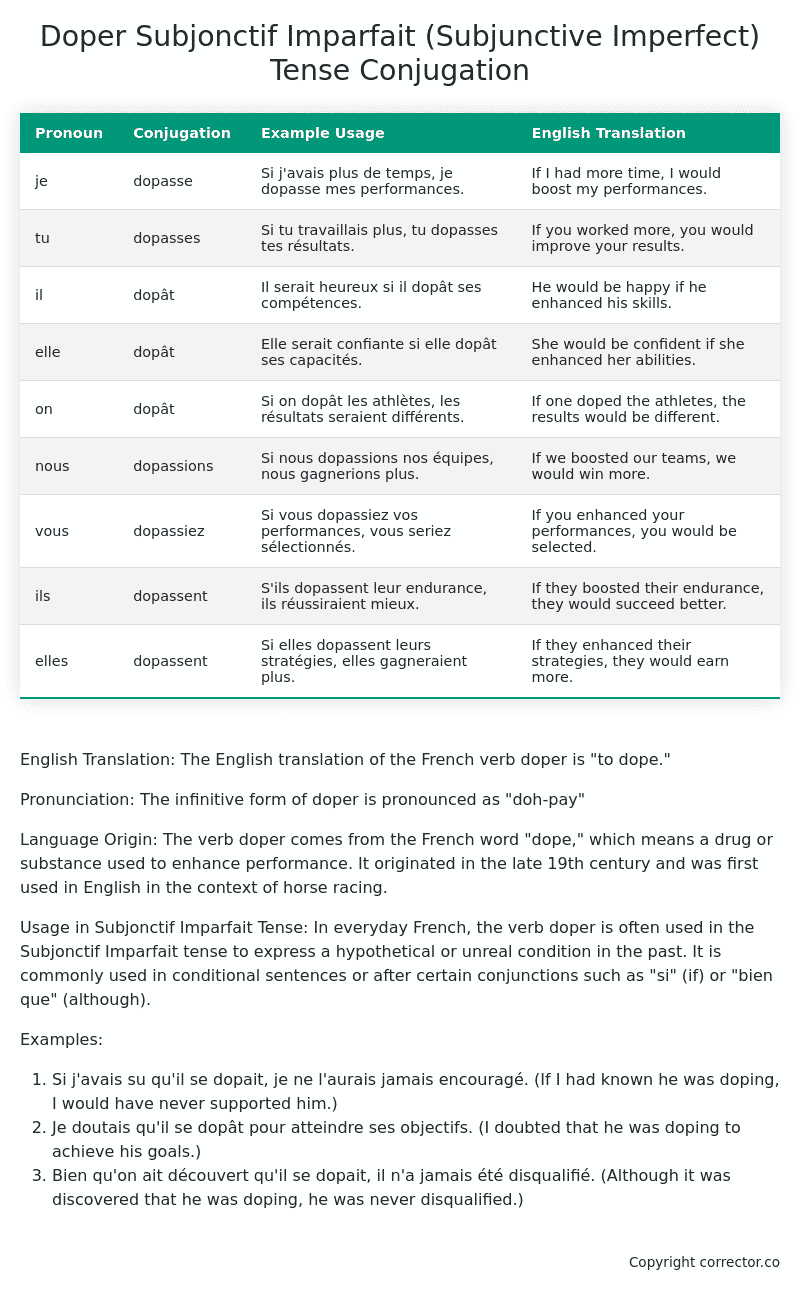Subjonctif Imparfait (Subjunctive Imperfect) Tense Conjugation of the French Verb doper
Introduction to the verb doper
English Translation: The English translation of the French verb doper is “to dope.”
Pronunciation: The infinitive form of doper is pronounced as “doh-pay”
Language Origin: The verb doper comes from the French word “dope,” which means a drug or substance used to enhance performance. It originated in the late 19th century and was first used in English in the context of horse racing.
Usage in Subjonctif Imparfait Tense: In everyday French, the verb doper is often used in the Subjonctif Imparfait tense to express a hypothetical or unreal condition in the past. It is commonly used in conditional sentences or after certain conjunctions such as “si” (if) or “bien que” (although).
Examples:
- Si j’avais su qu’il se dopait, je ne l’aurais jamais encouragé. (If I had known he was doping, I would have never supported him.)
- Je doutais qu’il se dopât pour atteindre ses objectifs. (I doubted that he was doping to achieve his goals.)
- Bien qu’on ait découvert qu’il se dopait, il n’a jamais été disqualifié. (Although it was discovered that he was doping, he was never disqualified.)
Table of the Subjonctif Imparfait (Subjunctive Imperfect) Tense Conjugation of doper
| Pronoun | Conjugation | Example Usage | English Translation |
|---|---|---|---|
| je | dopasse | Si j’avais plus de temps, je dopasse mes performances. | If I had more time, I would boost my performances. |
| tu | dopasses | Si tu travaillais plus, tu dopasses tes résultats. | If you worked more, you would improve your results. |
| il | dopât | Il serait heureux si il dopât ses compétences. | He would be happy if he enhanced his skills. |
| elle | dopât | Elle serait confiante si elle dopât ses capacités. | She would be confident if she enhanced her abilities. |
| on | dopât | Si on dopât les athlètes, les résultats seraient différents. | If one doped the athletes, the results would be different. |
| nous | dopassions | Si nous dopassions nos équipes, nous gagnerions plus. | If we boosted our teams, we would win more. |
| vous | dopassiez | Si vous dopassiez vos performances, vous seriez sélectionnés. | If you enhanced your performances, you would be selected. |
| ils | dopassent | S’ils dopassent leur endurance, ils réussiraient mieux. | If they boosted their endurance, they would succeed better. |
| elles | dopassent | Si elles dopassent leurs stratégies, elles gagneraient plus. | If they enhanced their strategies, they would earn more. |
Other Conjugations for Doper.
Le Present (Present Tense) Conjugation of the French Verb doper
Imparfait (Imperfect) Tense Conjugation of the French Verb doper
Passé Simple (Simple Past) Tense Conjugation of the French Verb doper
Passé Composé (Present Perfect) Tense Conjugation of the French Verb doper
Futur Simple (Simple Future) Tense Conjugation of the French Verb doper
Futur Proche (Near Future) Tense Conjugation of the French Verb doper
Plus-que-parfait (Pluperfect) Tense Conjugation of the French Verb doper
Passé Antérieur (Past Anterior) Tense Conjugation of the French Verb doper
Futur Antérieur (Future Anterior) Tense Conjugation of the French Verb doper
Subjonctif Présent (Subjunctive Present) Tense Conjugation of the French Verb doper
Subjonctif Passé (Subjunctive Past) Tense Conjugation of the French Verb doper
Subjonctif Imparfait (Subjunctive Imperfect) Tense Conjugation of the French Verb doper (this article)
Subjonctif Plus-que-parfait (Subjunctive Pluperfect) Tense Conjugation of the French Verb doper
Conditionnel Présent (Conditional Present) Tense Conjugation of the French Verb doper
Conditionnel Passé (Conditional Past) Tense Conjugation of the French Verb doper
L’impératif Présent (Imperative Present) Tense Conjugation of the French Verb doper
L’infinitif Présent (Infinitive Present) Tense Conjugation of the French Verb doper
Struggling with French verbs or the language in general? Why not use our free French Grammar Checker – no registration required!
Get a FREE Download Study Sheet of this Conjugation 🔥
Simply right click the image below, click “save image” and get your free reference for the doper Subjonctif Imparfait tense conjugation!

Doper – About the French Subjonctif Imparfait (Subjunctive Imperfect) Tense
Formation
Common Everyday Usage Patterns
Interactions with Other Tenses
Subjonctif Présent
Indicatif Passé Composé
Conditional
Conditional Perfect
Summary
I hope you enjoyed this article on the verb doper. Still in a learning mood? Check out another TOTALLY random French verb conjugation!


